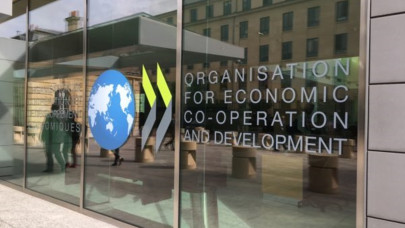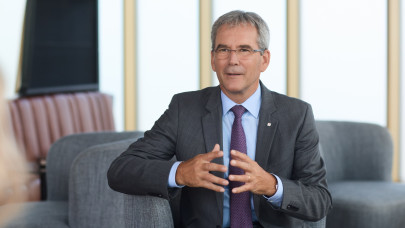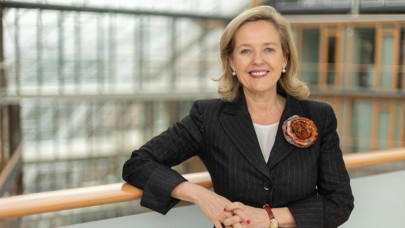The EIB Group, which also includes the European Investment Fund (EIF), committed €36.2 billion in 2023 for projects in poorer EU areas known as cohesion regions. This represented almost half (47%) of the EIB Group's lending and investments in the EU last year. Cohesion lending by the EIB alone in 2023 amounted to €29.8 billion, or 45.1% of total EU financing commitments, surpassing a 42% target set by the bank.
The EIB's cohesion lending in 2023 reached its highest level in the bank's 65-year history, with a notable increase in financing for small and medium-sized enterprises (SMEs) and mid-caps. Support for climate action and environmental sustainability came to 60% of the total commitments in cohesion regions. The top five beneficiary countries last year were France, Spain, Poland, Italy, and Greece.
“Social and territorial cohesion is at the heart of the EIB Group's mission and among our top strategic priorities,” said EIB Group President Nadia Calviño. “While talent is equally spread, opportunities are not, and - in support of EU policies - we are helping to bring opportunities to where that talent is. Each place, each region matters.”
Operations signed by the EIB in 2023 are expected to allow for:
- More than 5 million people accessing improved health services;
- Supplying more than 6 million households with electricity generated from renewable-energy sources;
- Enabling more than 6 million new subscribers to 5G services;
- Significant direct and indirect job creation.
“The EIB Group is delivering on its commitments and devoting substantial resources to cohesion. In addition to financing, two thirds of our advisory services target cohesion regions, providing comprehensive support tailored to the needs of public authorities, financial institutions, and project promoters,” said EIB Vice-President Kyriacos Kakouris. “Cohesion policy is the most visible face of EU solidarity and is as important as ever to speed up the green and digital transitions.”
EIF commitments to credit guarantees, venture capital and private equity investments for cohesion regions in 2023 stood at €6.8 billion, representing 49% of total EIF commitments in the EU. The top five beneficiary countries were Romania, Bulgaria, Poland, France and Italy.
"Ensuring competitiveness and cohesion across the EU is fundamental for an inclusive future, but also a stronger EU in the global arena,” said EIF Chief Executive Marjut Falkstedt. “Throughout 2023, we have provided extensive support to small businesses located in many developing regions of Europe, largely exceeding our targets, and also made important contributions in building up local finance ecosystems as well.”
The new publication also highlights key elements of regional disparities, confirming trends outlined in the European Commission's 9th Cohesion report, and suggests how targeted social investments and connectivity can contribute to overcoming such differences. Alleviating cohesion barriers will require the front-loading of substantial investments amid a significant funding gap. Investments in better skills and education, affordable housing, connectivity and access to services will help bridge the divide between cohesion and non-cohesion regions across the EU, improve the well-being of society as a whole and support sustainable growth.
In general, the EU categorises regions into three groups based on economic development levels: less developed, transition and more developed. EIB lending to less-developed regions amounted to €17.2 billion– 26% of the EU total and above a 21% key-performance goal set by the bank.
All EU countries (except Luxembourg) have cohesion – including transition – regions and targeted investments in these areas are key to unlocking their potential. While substantial progress has been made in EU convergence at the national level, regional performances within countries remain uneven. Support toward cohesion policy is among the eight top priorities of the EIB Group, according to the Strategic Roadmap for the years 2024-2027, which was unanimously adopted by the EU financing arm's shareholders in June.
The European Investment Fund (EIF) is part of the EIB Group. It supports Europe's SMEs by improving their access to finance through a wide range of selected financial intermediaries. The EIF designs, promotes and implements equity and debt financing instruments targeting SMEs. In this role, the EIF fosters EU objectives in support of entrepreneurship, growth, innovation, research and development, the green and digital transitions and employment.
In 2021, the EIB adopted a Cohesion Orientation for 2021-2027 that calls on the Bank to raise its lending in cohesion regions to 45% of its total lending in the European Union by 2025. It also calls for just over half the amount, 23%, to go towards less developed regions. Support for the green transition and innovation are prominent, as is the role of advisory support to accelerate investment. Cohesion has also become a key performance indicator for the EIF, which set a goal of increasing its cohesion-dedicated activity volumes from 38% to 40% by 2023.










